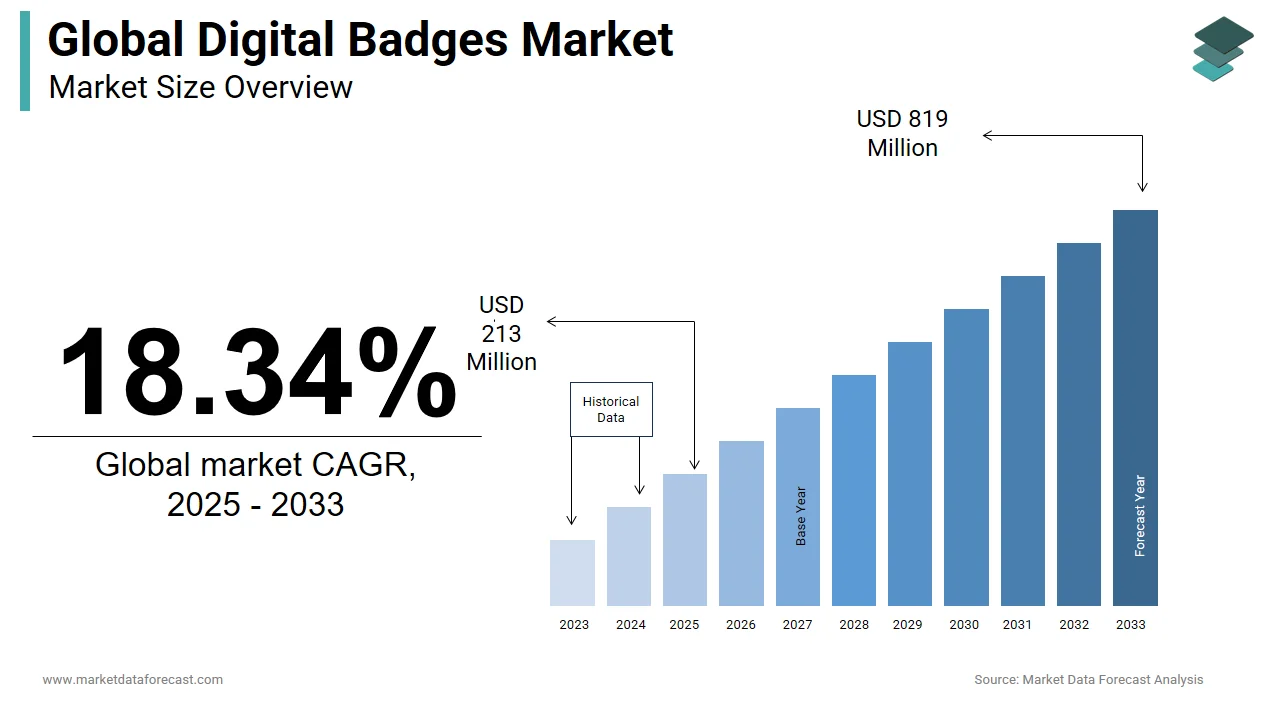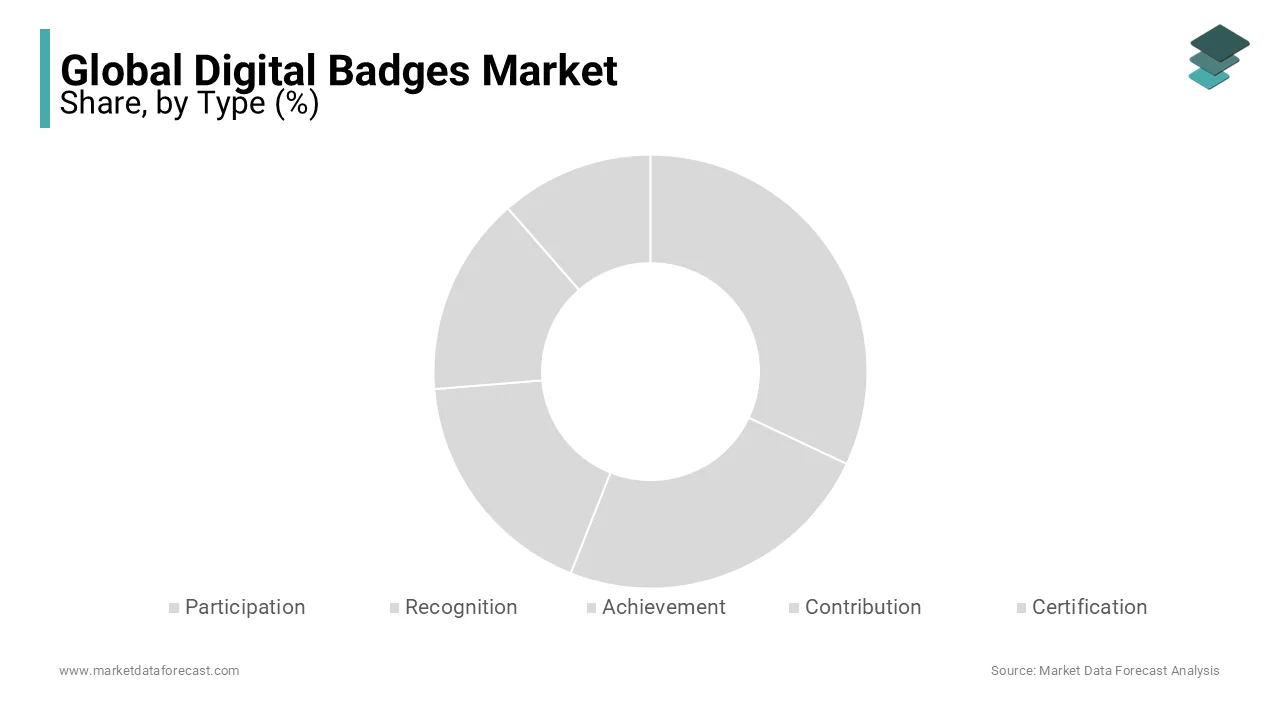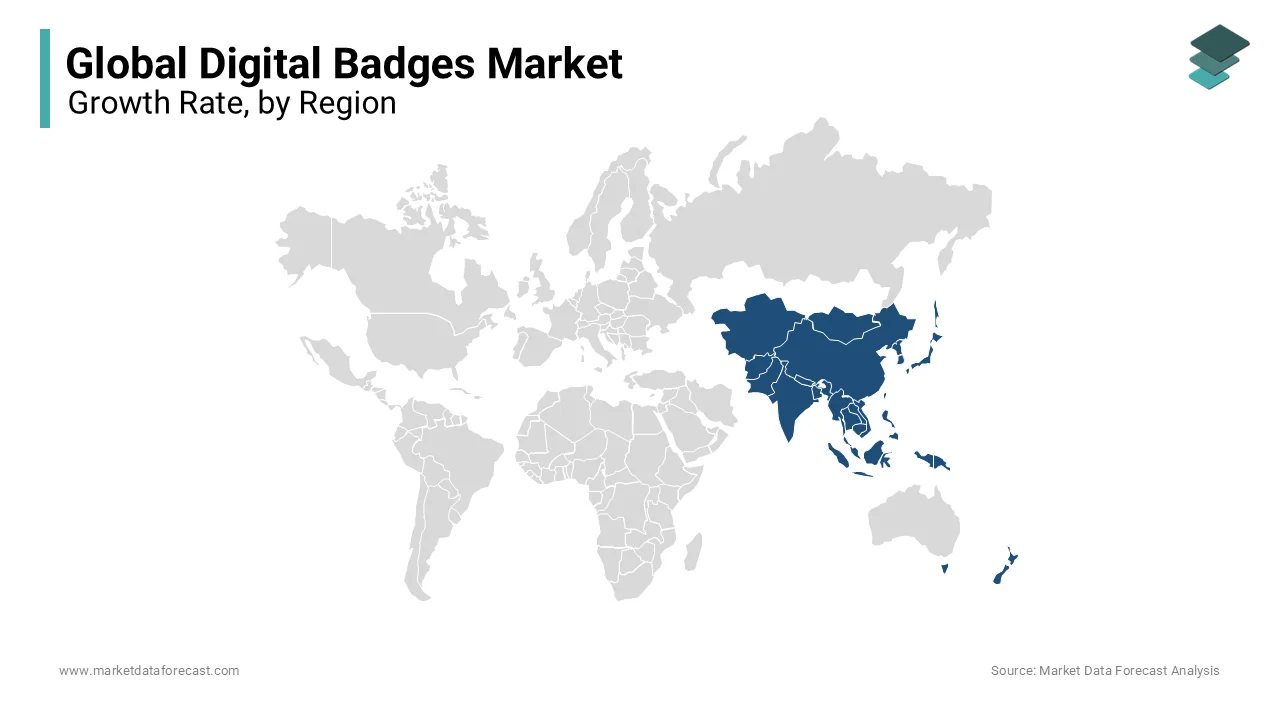Global Digital Badges Market Size, Share, Trends, & Growth Forecast Report – Segmented By Type (Participation, Recognition, Achievement, Contribution, Certification), By End-Users (Education, Corporate, Retail, Gaming, Transportation, Others) & Region - Industry Forecast From 2024 to 2032
Global Digital Badges Market Size (2024 to 2032)
The global digital badge market was worth USD 152 million in 2023. The global market is predicted to reach USD 180 million in 2024 and USD 690 million by 2032, growing at a CAGR of 18.34% during the forecast period.

Digital badges, unlike their traditional counterparts, are electronic records that contain verified metadata about the qualification and the process to achieve it. They are tamper-proof, preventing any unauthorized modifications, and can be easily shared online. These unique features, coupled with their increasing availability on various platforms, including online settings, contribute to their growing popularity.
Current Scenario of the Global Digital Badges Market
The global digital badge market has experienced substantial growth, propelled by the rapid advancements in the online learning and education industry worldwide. Digital badges have emerged as a popular choice in the industry, serving as a crucial subset of the digital identification mechanism that facilitates online access and verification of skills and achievements. These badges are increasingly being obtained in a variety of learning settings, both formal and informal, indicating a clear trend in the online learning industry.
Companies and stakeholders in the education sector stand to gain significantly from the services and platforms associated with the assignment of digital credentials. These badges can be applied for or awarded to a diverse range of entities, including those seeking credentials in higher education, associations, training programs, and boot camps. The verification process is straightforward, with metadata accessible in a user-friendly visual format, offering a promising future for the digital badge market.
The study's information helps participants shed light on current trends shaping new frontiers in the global digital badge market. Critical assessment of the dynamics of demand for digital credentials in various regions helps provide insight into the main untapped application segments.
MARKET TRENDS
Digital badges have created a new way of evaluating students as per their learning preference in education. With badges, students can be rewarded based on their overall performance and not just a test to promote learning. Digital badges allow educators to appreciate students for their achievements. These successes include learning, positive behavior, efforts, skills, etc. They can also be awarded to students who strive to excel, motivate, and encourage learning.
Digital badges can be incorporated into all levels and areas of learning, including goals and objectives. A group of researchers conducted a study in 2018 to determine the effect of digital badges on the definition of learning objectives and the motivation of students to achieve them. The result was positive. The research examines whether or not digital credentials are effective educational tools and how best to use them in higher education institutions. Other uses of badges in higher education include virtual accreditation systems that allow students to present newly acquired skills and master new content.
MARKET DRIVERS
The growing demand for digital learning and social learning via online media is a major trend that is increasing the demand for digital badges.
The digital badge market is also benefiting from an increase in the volume of investments companies make in developing their employees' professional skills. This is a crucial trend in various industries. The shift to digital learning and education, especially in developing nations, has created promising opportunities in this market. The growing attention by professionals to the need to constantly update their skills is catalyzing the expansion of the global digital badge market. The advent of professional development programs from leading ERP vendors such as SAP, Oracle, SAS, and IBM is driving the rapid expansion of the digital badge market.
MARKET RESTRAINTS
However, the outlook for the global digital badge market is hampered by a shortage of robust infrastructure in several emerging regions. The slow adoption of digital accreditation programs in Africa is a case in point. In addition, the lack of universal acceptability between institutions and countries is a major challenge for providers of digital credentials in various regions of the world. However, the growing trend towards gamification has more people in its field.
REPORT COVERAGE
|
REPORT METRIC |
DETAILS |
|
Market Size Available |
2023 to 2032 |
|
Base Year |
2023 |
|
Forecast Period |
2024 to 2032 |
|
CAGR |
18.34% |
|
Segments Covered |
By Type, End User, and Region |
|
Various Analyses Covered |
Global, Regional & Country Level Analysis, Segment-Level Analysis, DROC, PESTLE Analysis, Porter’s Five Forces Analysis, Competitive Landscape, Analyst Overview on Investment Opportunities |
|
Regions Covered |
North America, Europe, APAC, Latin America, Middle East & Africa |
|
Market Leaders Profiled |
Credly Inc. (US), Accredible (US), Nocti Business Solutions (US), RedCritter Corp. (US), Accreditrust Technologies LLC (US), Concentric Sky Inc. (US), Forall Systems Inc. (US), Blackboard Inc. (US), Badgecraft (Lithuania), LearningTimes LLC (United States), and Others. |
SEGMENTAL ANALYSIS
Global Digital Badges Market Analysis By Type

The global digital badges market is segmented into participation, recognition, achievement, contribution, and certification.
Global Digital Badges Market Analysis By End User
For end users, the digital badges market is segmented into education, corporate, retail, gaming, transportation, etc. The education segment is classified into K-12 and higher education segments, while the business segment is classified into small and medium enterprises (SMEs) and large enterprises. Of these, the education division accounted for the dominant portion that is likely to continue in the outlook period in this industry.
REGIONAL ANALYSIS

Based on the regional outlook, the global market is spread across North America, Europe, Asia Pacific, Latin America, the Middle East, and Africa. Developing regions like the Asia Pacific should be potentially attractive markets for digital badges. Growth is driven by the rapid pace of new product launches and improvements. It is also expected that the growing employer focus on talent development will stimulate these regional markets. Developed regions like the United States should experience new market avenues. This is attributed to the many products constantly being released to meet a wide variety of end-user learning and skill needs.
KEY PLAYERS IN THE GLOBAL DIGITAL BADGES MARKET
The main players in the global digital badge market include Credly Inc. (US), Accredible (US), Nocti Business Solutions (US), RedCritter Corp. (US), Accreditrust Technologies LLC (US), Concentric Sky Inc. (US), Forall Systems Inc. (US), Blackboard Inc. (US), Badgecraft (Lithuania) and LearningTimes LLC (United States). These players mainly contribute to the growth of the market.
RECENT HAPPENINGS IN THE GLOBAL DIGITAL BADGES MARKET
-
In September 2019, The Professional English Test (OET), the premier English test for healthcare professionals, became the first English test approved by healthcare regulatory bodies to reward successful applicants with Digital Badges.
-
In September 2019, The Institute of Engineering Management (EMI) partnered with digital credential provider Credly through its Acclaim platform to provide its certification holders with a digital credential for their EMI certifications.
-
In February 2019, Badges for the HAP accreditation program began to be issued through Acclaim and HPass, which are complementary platforms.
DETAILED SEGMENTATION OF THE GLOBAL DIGITAL BADGES MARKET INCLUDED IN THIS REPORT
This research report on the global digital badges market has been segmented and sub-segmented based on the type, end-user, and region.
By Type
-
Participation
-
Recognition
-
Achievement
-
Contribution
-
Certification
By End User
-
Education
-
Corporate
-
Retail
-
Gaming
-
Transportation
By Region
-
North America
-
The United States
-
Canada
-
Rest of North America
-
-
Europe
-
The United Kingdom
-
Spain
-
Germany
-
Italy
-
France
-
Rest of Europe
-
-
The Asia Pacific
-
India
-
Japan
-
China
-
Australia
-
Singapore
-
Malaysia
-
South Korea
-
New Zealand
-
Southeast Asia
-
-
Latin America
-
Brazil
-
Argentina
-
Mexico
-
Rest of LATAM
-
-
The Middle East and Africa
-
Saudi Arabia
-
UAE
-
Lebanon
-
Jordan
-
Cyprus
-
Frequently Asked Questions
What industries are driving the growth of the digital badges market?
The digital badges market is experiencing growth across various industries, including education, corporate training, healthcare, IT, and professional associations. These sectors are leveraging digital badges to recognize and validate skills, competencies, and achievements in a digital format.
Are digital badges recognized by employers and educational institutions worldwide?
The recognition of digital badges by employers and educational institutions varies depending on factors such as industry norms, geographic location, and the reputation of the badge issuer. However, as digital badges gain prominence and standardization efforts progress, their recognition is increasing globally.
How are regulatory and privacy concerns addressed in the issuance and use of digital badges?
Regulatory and privacy concerns related to digital badges are addressed through compliance with data protection laws, industry standards, and best practices for data security and privacy. Issuers often implement transparent policies regarding data collection, storage, and sharing, ensuring user consent and protection of personal information.
What are the future prospects for the digital badges market on a global scale?
The digital badges market is poised for continued growth globally, driven by factors such as the increasing demand for skills validation, the rise of online learning and remote work, and the need for agile credentialing systems. As awareness and acceptance of digital badges grow, they are likely to become more integrated into education and workforce ecosystems worldwide.
Related Reports
Access the study in MULTIPLE FORMATS
Purchase options starting from $ 2500
Didn’t find what you’re looking for?
TALK TO OUR ANALYST TEAM
Need something within your budget?
NO WORRIES! WE GOT YOU COVERED!
Call us on: +1 888 702 9696 (U.S Toll Free)
Write to us: [email protected]